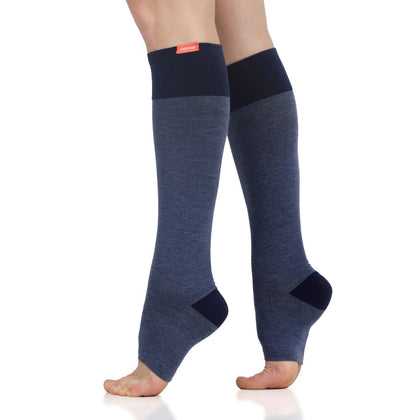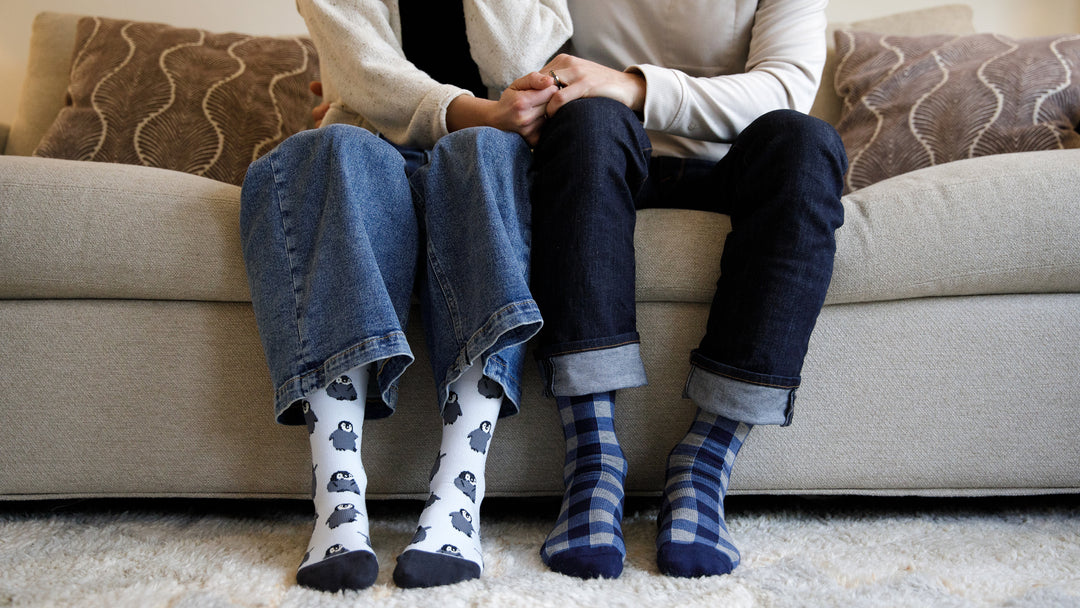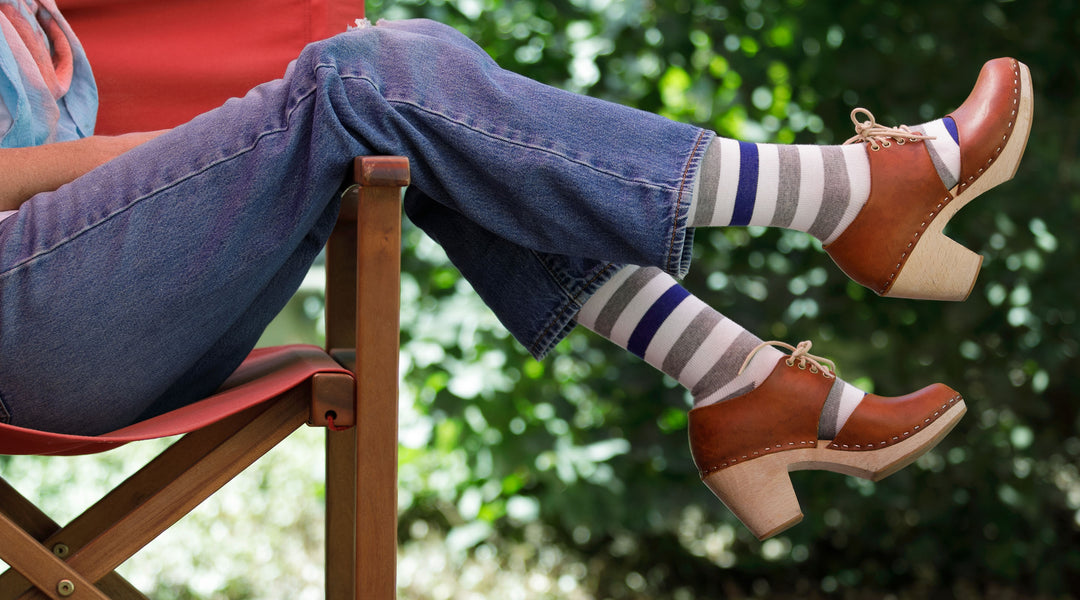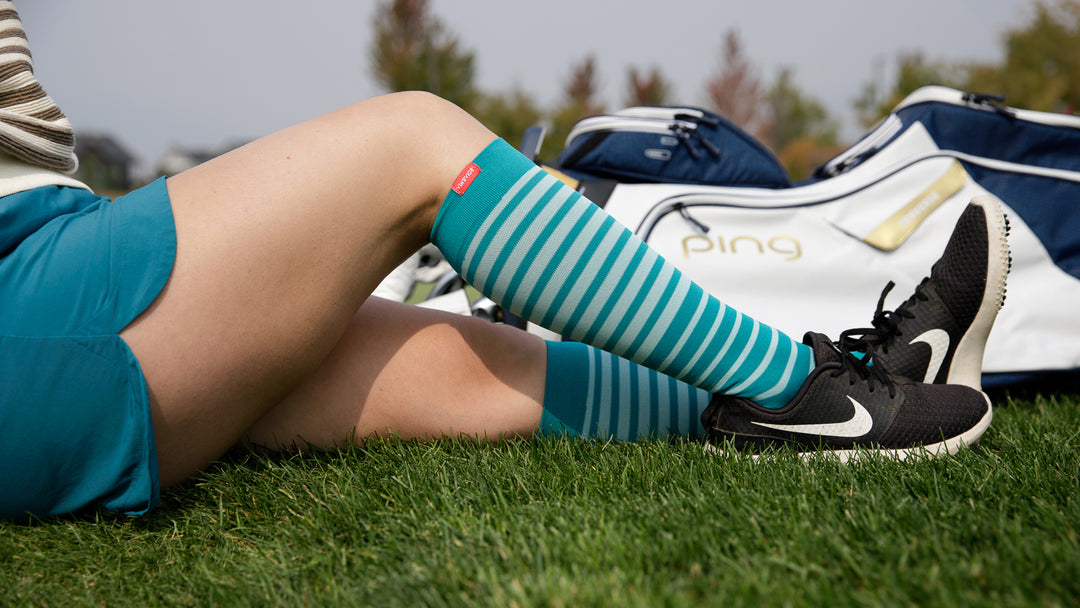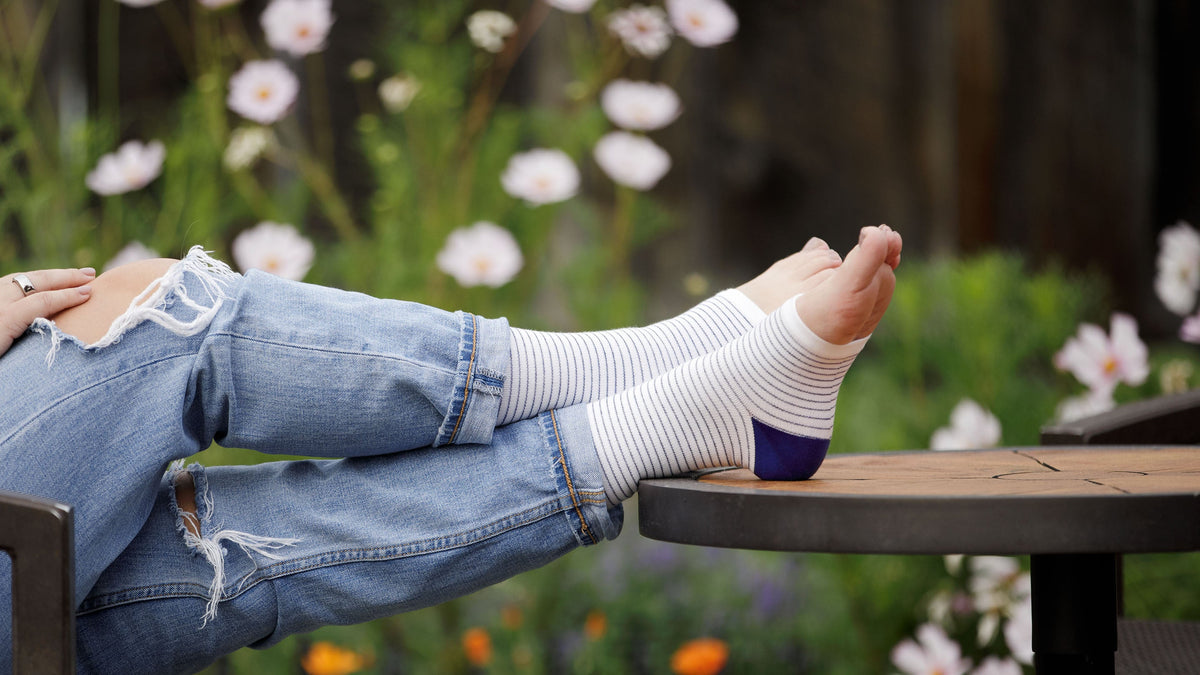

Sweaty feet are a part of life. Whether you’re a runner, a hiker, or a sock-wearer who found themself exasperated by sweaty, smelly feet at the end of the day… good news! Simple solutions for sweaty feet exist!
You might ask yourself, why do we get sweaty feet in even the best-quality socks? Simply put, many factors are at work. Yes, temperature and humidity play a role in how sweaty and smelly your feet can get. So does your choice of shoes. Then, there are the socks. If you’ve been looking for socks that don’t make your feet sweat, we have a helpful guide on what to consider as you make your choice of footwear this summer.
Why Do Feet Sweat So Much?
Before we can delve into finding the ideal socks for sweaty feet, let’s first understand why our feet sweat. Sweating is a normal process whereby our bodies are working to regulate our temperature by having sweat evaporate on our skin (also called thermoregulation). However, sometimes, it often feels like it’s too much — usually, in the case of a specific health condition.
If you are a person that has to manage hyperhidrosis (excessive sweating) or hyperthyroidism (an overactive thyroid gland), your feet may sweat more than average. Stress or anxiety also creates sweat as a natural reaction in the body. And, of course, being active and exercising can lead to sweating — especially in the heat. In the case of our feet, our choice of socks and shoes is critical to wick away the sweat, rather than reduce it. We don’t want to simply “not sweat” since sweating is the body’s natural way to cool down. The key is to:
Ensure that sweat is wicked away from your feet. If it is not, it increases the risk of blistering or unpleasant odors.
Wear breathable fabrics so the air can move freely inside your socks and against the skin.
Keep feet clean and dry, ensuring you wash immediately after exercising.
Health Implications of Sweaty Feet
Are sweaty feet a potential health hazard? Definitely not right away, and it may rarely occur, if at all. Yes, you get smelly and uncomfortable, but you won’t develop an illness from it. One of the key dangers for runners and hikers or long-distance walkers is developing blisters because of sweaty feet, but that’s pretty much the extent of it.
However, in cases of extremely sweaty feet, you should be aware of several health concerns.
Athlete’s Foot
Athlete’s foot (also called Tinea Pedis) is a fungal skin infection that develops in humid, sweaty environments. It usually starts between the toes, with feelings of itchiness that can develop into a rash and scaly skin. It’s not only caused by sweaty feet - you could also get it from contaminated towels or floors in a gym or other public space.
You can treat athlete's foot relatively easily with over-the-counter creams, but if it gets steadily worse, you should see a doctor.
Bacterial Infections
The next level up from athlete’s foot are bacterial infections that can develop on your feet and around the toenails because of keeping the feet in a sweaty, dirty environment for a long time.
If you have a cut or graze on the skin, coupled with the sweaty conditions, your feet can become infected by nasty bacteria. You should always try to clean and dry your feet regularly when you’re doing multi-day walks or expeditions, or if you suffer from sweaty feet on a regular basis. This care will reduce the risk of infections getting worse.

Bromodosis
Bromodosis is the medical term for (critically) bad smelling feet. This condition is caused by a build-up of bacteria and sweat, left untreated and/or uncleaned for a prolonged period. Having a good hygiene routine for your feet and using some antibacterial treatments and special antiperspirants can help deal with this.
Hyperhidrosis
Finally, excessive, profuse sweating is called hyperhidrosis. This is known to be a genetic condition. It may also come about in combination with a different primary illness or condition that causes dysregulation in the sympathetic nervous system.
What to Look For in Socks for Sweaty Feet
Regardless of whether you have a medical condition causing sweaty feet, you’ll still want to know what socks don’t make your feet sweat in hot conditions, or at least how to find socks that are comfortable, moisture wicking, and breathable enough to avoid too much sweat (and definitely any odors!). Here are our top tips.
Moisture-Wicking Materials
The best socks for smelly feet are made from moisture-wicking materials. These fabrics allow moisture to evaporate from the surface of the skin, instead of getting trapped between the sock and the skin. The best moisture-wicking materials include merino wool and moisture-wick nylon.
Breathability
As we said above, sweat is normal and a natural response from your body to help you cool down. What we need from our socks is to remove the moisture from the surface of the skin (moisture-wicking), while allowing air to circulate in and out of the sock. So, you should choose breathable fabrics and ensure that the way the socks have been woven allows for air to go through the fibers. Linen, cotton, bamboo, and merino wool are known for their breathability.
Additionally, make sure your breathable socks are paired with breathable shoes! Otherwise, the air will simply be trapped in your shoes, eventually keeping your feet sweaty and smelly (even if a little bit less than if your socks weren’t adequate, either!).
Cushioning and Thickness
One bonus of good-quality socks that keep your feet dry and happy is that they also provide adequate cushioning. This means that the soles of your feet don’t just rub against the interior of the shoes, possibly causing blisters and getting even hotter. A nice, soft layer under the foot, sometimes made with reinforced padding, can make a huge difference on a hot day.

Odor Resistance
Did you know that there are materials that are simply odor resistant? For socks that don’t make your feet sweat or smell, merino wool is an ideal choice as it has natural antibacterial and odor resistant fibers. These types of socks don’t allow bacteria to grow on your skin and cause the embarrassing odors in the first place.
Sock Styles
Finally, depending on what you’re doing and the weather conditions, the best socks for sweaty feet could be a different style or design than you’re used to. For example, many runners prefer shorter socks in warm weather, to allow the lower legs to breathe (think ankle socks vs. knee-high socks).
Or you could opt for open-toe compression socks when you want to get the benefits of compression, but need to let your toes breathe or want to wear flip-flops or sandals. Make sure to browse all available options and test them in various weather conditions to find your best match.
Are Compression Socks Good for Sweaty Feet?
Compression socks apply therapeutic pressure to the lower limbs to improve circulation and support the muscles and joints. The way they work can help reduce the uncomfortable symptoms of sweaty feet (and even prevent sweating to an extent). Our Vim & Vigr compression socks are even made with the breathable and moisture-wicking properties you need for sweaty feet.
Improve Circulation
Graduated compression socks are tighter around the ankles and feet, reducing pressure as they climb up the lower legs towards the knees. This stimulates blood flow upwards, reducing the risk of getting swollen ankles and feet, and keeping your muscles relaxed and feeling light. It’s an added bonus if you’re on your feet all day and are battling heat and humidity, as well.
Reduce Swelling
Compression socks boost your feet and lower legs’ well-being by preventing the formation of edema or other vein-related problems (think varicose veins). With lighter, more energized feet, you will feel a boost of vitality. What’s more, less swollen feet don’t rub against the edges of your shoes and are less likely to get even hotter and less comfortable when it’s warm out.
Increase Comfort
Wearing compression socks for sweaty feet means that your feet will swell less, they’ll feel less heavy, and they won’t ache so much in extreme heat and humidity. If you work to manage hyperhidrosis, these extra elements of comfortable compression socks reduce the extent of foot care you do every day. And, as mentioned above, avoiding swollen feet also makes them less sweaty and uncomfortable in your shoes.
Regulate Temperature
An optimized blood flow may also help your feet and whole body to better regulate temperature. This can lead to less sweating, keeping your feet from getting uncomfortable and stinky.
The Best Compression Socks for Sweaty Feet
Despite their benefits, not all compression socks are going to be 100% effective against sweat. We recommend these three styles for their moisture wicking, breathable qualities that complement the boost in blood flow and muscle support.
Merino Wool Hiking and Running Socks
Professional athletes and recreational joggers alike use merino wool socks when they’re out on trails and roads. Merino wool socks are some of the best socks that don’t make feet sweat, thanks to their breathable, lightweight fabric and the fact that their fibers are naturally moisture-wicking. Merino fibers absorb moisture from the foot and hold on to it, keeping your feet dry when you’re exercising. Moreover, they are naturally odor resistant (a bonus for long days out) and dry quickly. If you’re traveling or doing multi-day hikes, you can wash your socks in cold water and let them air dry overnight.

Moisture-Wick Nylon Socks
At Vim & Vigr, we’ve been looking at other materials that can keep your feet sweat free and comfortable in hot weather. We came up with our moisture-wick nylon range, which is lightweight and very flexible. You won’t even feel you’re wearing socks!
Open-Toed Compression Socks
Finally, if you’re concerned about your toes being crushed in your compression socks, or need to let them breathe for medical reasons or to match your flip-flops, then you can choose open-toed designs. These help when you’re treating a fungal infection or when you just want more fresh air on your feet and toes.
Socks That Don’t Make Your Feet Sweat in Different Conditions
Vim & Vigr compression socks have been designed to bring together science and style, but also to keep you comfortable in all types of weather and environments. They work to support your veins, joints, and muscles, relieving pressure and boosting your blood flow in scenarios where you need it the most.
Socks for All-Day Work Wear
Jobs where you are on your feet all day, such as in construction work or if you’re a teacher, require special attention to comfort. With graduated compression socks in a breathable material like merino wool, you’re preventing blood from pooling in the lower legs, which reduces the risk of swelling and discomfort. At the same time, no matter if you have to wear cumbersome boots or high heels, you can also benefit from the breathability and moisture wicking qualities of your socks.

Socks for Travel or Long Flights
When you travel long distances, such as on a plane or train, your feet are not moving a lot. This can lead to swelling and even pain from blood and lymph fluid pooling in the lower limbs. To prevent this, wearing compression socks boosts circulation and massages the lower legs, all while keeping your feet cool and dry.

Socks for Summer or Hot Climates
Don’t be fooled by the longer length or by how tight they fit, compression socks are great for summer wear, as long as you choose the style and fabric that will keep your feet dry! Summer compression socks include open-toed, merino wool, or moisture wick nylon options.
And don’t forget compression sleeves — they are a great alternative to enjoy compression while going barefoot. They are supportive of your calf muscles, helping improve circulation in the lower legs, and giving you a boost when training or speeding up your post-exercise recovery.
Additional Tips for Managing Sweaty Feet
Still looking for ways to improve your foot happiness this summer? Besides choosing the best compression socks for sweaty feet, here are expert tips for staying keeping your feet dry and comfortable.
Focus on Foot Care and Hygiene
Caring for your feet and for your socks is always essential, but even more so when you’re struggling with sweaty, smelly feet. After every wear, you should wash your socks and let them air dry as per our compression sock care guide here.
You also need to take extra care washing your feet. Shower regularly and use an antibacterial soap, especially if you regularly struggle with bad odors.
And don’t forget about drying! Your feet need to be completely dry before you put on socks, so use a clean towel and remove any moisture, paying attention to the space between your toes. Start with a clean slate!
Choose the Right Footwear
Shoes made from synthetic materials are less breathable, so should be avoided. We also recommend steering clear of really tight-fitting shoes, as they’ll only cause your feet to rub and get hotter, while also swelling and feeling like the shoes are even tighter still! Sometimes, sandals or open-toed footwear could be your best choice to get maximum breathability and comfort.
Use Antifungal Powders and Antiperspirants
For extra help with smelly feet, you could use a foot powder or special antiperspirant. Antiperspirants block the sweat ducts and can be prescribed for hyperhidrosis treatment. They need to be applied on clean, dry feet, at the start of the day.
At night, put on an antifungal foot powder or spray after cleaning your feet to treat any complications and to keep them dry. You can also opt for medicated insoles that function as a deodorant.
Use Moisture-Absorbing Insoles If Needed
Another good addition to socks that help with sweaty feet is a moisture-absorbing insole. These are made from highly absorbent materials to help reduce sweat and the risk of bacterial infection. You can find activated carbon, silica gel, or insoles made from natural fibers like bamboo or wool, or from synthetic fibers like polyester or nylon. However, always make sure to try these on with the shoes and socks you plan to wear out, as they add an extra layer inside your shoes and this can affect comfort levels.
You should also take care to trim your toenails and keep them clean and tidy, in order to avoid the onset of fungal infections. Finally, make sure you’re always wearing a fresh pair of socks at the start of the day to keep those feet happy!
Discover our best socks for smelly feet - no matter the weather:
References
Adamczyk, K., Garncarczyk, A., Antończak, P., & Wcisło-Dziadecka, D. (2020). The foot microbiome. Journal of cosmetic dermatology, 19(5), 1039–1043. Read it here.
Baker L. B. (2019). Physiology of sweat gland function: The roles of sweating and sweat composition in human health. Temperature (Austin, Tex.), 6(3), 211–259. Read it here.
Charles, T., Mackintosh, D., Healy, B., Perrin, K., Weatherall, M., & Beasley, R. (2011). Merino wool graduated compression stocking increases lower limb venous blood flow: a randomized controlled trial. Advances in therapy, 28(3), 227–237. Read it here.
Cleveland Clinic. (2024). Hyperthyroidism. Read it here.
Ivankovic, T., Rajic, A., Ercegovic Razic, S., Rolland du Roscoat, S., & Skenderi, Z. (2022). Antibacterial Properties of Non-Modified Wool, Determined and Discussed in Relation to ISO 20645:2004 Standard. Molecules (Basel, Switzerland), 27(6), 1876. Read it here.
Leung, A. K., Barankin, B., Lam, J. M., Leong, K. F., & Hon, K. L. (2023). Tinea pedis: an updated review. Drugs in context, 12, 2023-5-1. Read it here.
Mayo Clinic Staff. (2023). Athlete’s Foot. Mayo Clinic Press. Read it here.
Mayo Clinic Staff. (2024). Hyperhidrosis. Mayo Clinic Press. Read it here.
National Health Service. (2025). Smelly feet. Read it here.
Parveen, A., Abbas, S., Mehmood, N., Patafi, M. A. M., Wajid, U., Luqman, M., & Arshad, S. (2023). Primary hyperhidrosis: From a genetics point of view. Journal of family medicine and primary care, 12(12), 3028–3032. Read it here.
Sugahara, I., Doi, M., Nakayama, R., & Sasaki, K. (2018). Acute effect of wearing compression stockings on lower leg swelling and muscle stiffness in healthy young women. Clinical physiology and functional imaging, 10.1111/cpf.12527. Advance online publication. Read it here.








